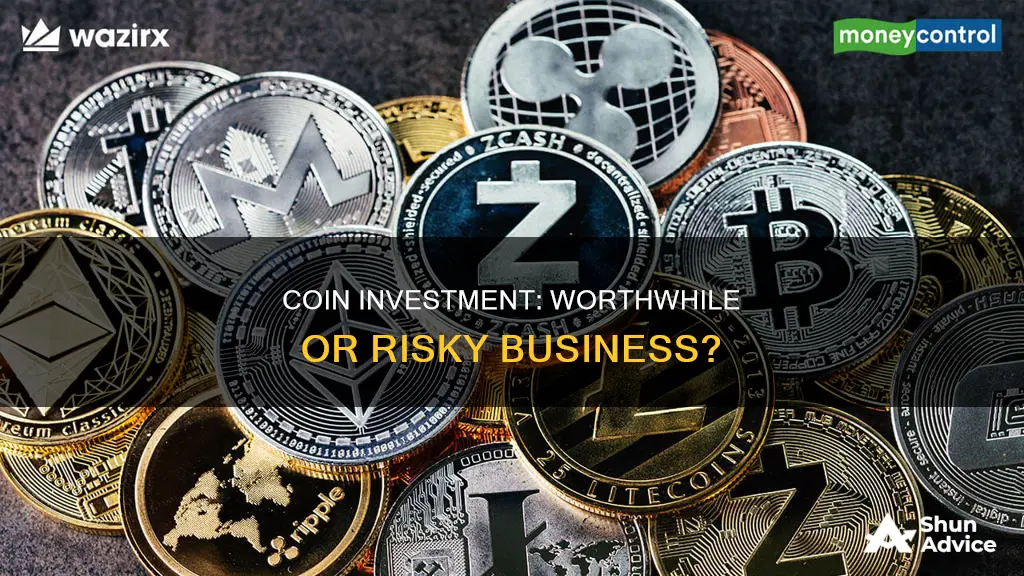
Investing in cryptocurrency can be a double-edged sword. While it has the potential to make you filthy rich, it is also possible that you lose all your money. Cryptocurrency is a good investment if you want direct exposure to the demand for digital currency.
Bitcoin, the largest cryptocurrency by market cap, has been making headlines for its exponential growth and ability to maintain its title as the most valuable cryptocurrency. After gradual gains throughout 2023, Bitcoin hit new record highs in March 2024, rising above $70,000 for the first time.
However, deciding whether to invest in Bitcoin or not requires looking beyond today's headlines. Bitcoin is a risky investment with high volatility and should be considered only if you have a high-risk tolerance and are in a strong financial position.
What You'll Learn

Rare coins as a long-term investment strategy
Rare coins can be a good long-term investment strategy, but it is not a simple task and requires knowledge and expertise. The market for rare coins has changed over the years, and third-party grading services have helped to reduce the risk of purchasing them. However, it is still important to educate yourself and assemble a well-balanced portfolio.
A well-balanced portfolio of rare coins will include a variety of classic United States coins, such as half cents, large cents, early nickels, dimes, quarters, half dollars, and silver dollars. It is also worth considering investing in precious metals, such as gold bullion coins, to further diversify your portfolio.
It is important to note that investing in rare coins is not a quick way to make money. It is a long-term strategy that requires time and patience. The most successful investors in coins have an extremely long-term vision, spending years, if not decades, learning about the coins they are purchasing and studying the market valuation.
When it comes to older collectible coins, there is money to be made, but the average returns may not be as impressive as the stock market. The Professional Coin Grading Service's trademark index, the PCGS3000, is up about 3% over the past 12 months, compared to a 15% increase in the Dow Jones Industrial Average over the same period.
There are also risks involved in collecting coins, especially for novices. These include acquisition risk, market price risk, and selling risk. Acquisition risk refers to the possibility of paying too much for a coin, while market price risk is the chance that the value of the coin decreases after purchase. Selling risk involves the possibility of being tricked into selling a coin for less than it is worth.
To mitigate these risks, it is recommended to only deal with reputable coin dealers who are members of associations such as the American Numismatic Association and the Professional Numismatists Guild. It is also important to learn how to "grade" a coin, which means determining its condition, or to only purchase coins that have been certified by a top grading service.
In conclusion, rare coins can be a good long-term investment strategy, but it requires knowledge, patience, and a well-balanced portfolio. It is important to educate yourself about the coins you are purchasing, understand the market valuation, and be aware of the risks involved.
The Ultimate Guide to Investing in Dogecoin
You may want to see also

Risks of investing in cryptocurrency
Investing in cryptocurrency is risky, but it can be a good investment if you do it properly and as part of a diversified portfolio. Here are some of the risks of investing in cryptocurrency:
Volatility and Manipulation
The unregulated and anonymous nature of digital asset markets, combined with the susceptibility of cryptocurrencies to sentiment, emotion, and publicity, makes crypto prices volatile. Crypto exchanges, media owners, and influential investors can manipulate prices. This manipulation seems to be widespread, although not yet widely proven. The most used manipulation strategies include wash trading, dark pool trading, pump and dumps, and shilling.
Security and Custody
Storing cryptocurrencies can be risky. There have been significant incidents of theft on personal wallets and exchanges. Hacking remains a constant threat if cryptocurrencies are not correctly stored and protected. Investors cannot recover assets that get lost or stolen, and mistaken transactions cannot be reversed. Unlike traditional investing, cryptos don't have official safeguards or insurance.
Cyber-Security Risks
Trading platforms and third-party service providers are vulnerable to hacking and other malicious activities. For example, in August 2016, nearly 120,000 units worth US$72 million of bitcoins were stolen from the Bitfinex exchange in Hong Kong, leading to an immediate 23% drop in pricing.
Loss of Private Key
Bitcoins are stored in a digital wallet and are controllable only by the possessor of both the public and private keys. If the private key is lost, destroyed, or compromised, an investor may be unable to access their bitcoins, essentially losing them. If acquired by a third party, they may be able to gain access.
Regulatory and Tax Uncertainty
There is a high degree of uncertainty regarding the regulatory status of cryptocurrencies. Investors and entrepreneurs are concerned about the possibility of future restrictions, which may significantly impact the value of cryptocurrencies or even lead to a ban. The lack of regulatory clarity also creates uncertainty around tax obligations and record-keeping requirements.
Bitcoin Investment: A Smart Financial Move?
You may want to see also

Pros of investing in cryptocurrency
Cryptocurrency has become extremely popular over the past few years, and for good reason. Here are some of the pros of investing in cryptocurrency:
Protection from inflation
Inflation has caused the value of many currencies to decline over time. In contrast, almost every cryptocurrency is released with a fixed amount specified in its source code. For example, there are only 21 million Bitcoins released globally. So, as demand increases, its value will increase, preventing inflation.
Self-governed and managed
Governance and maintenance of any currency are critical factors for its development. Cryptocurrency transactions are stored by developers/miners on their hardware, and they receive a transaction fee as compensation. Miners have a vested interest in keeping transaction records accurate and up-to-date, maintaining the integrity of the cryptocurrency and keeping the records decentralized.
Decentralization
Decentralization keeps the currency monopoly-free and in restraint, so no single organization or government can determine the flow and value of the coin. This keeps the currency stable and secure, unlike fiat currencies, which are controlled by governments.
Cost-effective transactions
One of the most significant uses of cryptocurrencies is to send money across borders with minimal or no transaction costs. Cryptocurrency eliminates the need for third parties like VISA or PayPal, reducing or negating the extra transaction fees they would normally charge.
Easy transfer of funds
Cryptocurrencies offer a fast and efficient way to transfer funds directly between two parties without the need for a trusted third party like a bank or other financial institution. Transactions, whether international or domestic, are typically processed much faster than traditional bank transfers.
Secure and private
The blockchain ledger, which relies on complex mathematical puzzles, makes cryptocurrency safer than ordinary electronic transactions. Additionally, cryptocurrencies use pseudonyms that are not connected to any user accounts or stored data that could be linked to a profile, further enhancing privacy and security.
Exponential industry growth
The cryptocurrency industry has been one of the fastest-growing markets in recent memory. The total market cap of the cryptocurrency market grew from about $1.6 billion in 2013 to over $930 billion by September 2022, even including the "crypto winter" of 2022.
The possibility of outsized returns
Bitcoin has been one of the best-performing assets since its debut in 2009, rising from essentially zero value to tens of thousands of dollars, representing millions of percentage points' worth of gains. This potential for exponential growth is a significant advantage of investing in cryptocurrency.
Bitcoin Gold: A Worthy Investment or Digital Dud?
You may want to see also

Bitcoin's volatility
Bitcoin is considered a volatile asset. Volatility is a measure of how much the price of a financial asset varies over time. The more volatile an asset, the riskier it is to hold. Volatility also increases the cost of hedging, which is a major contributor to the price of merchant services.
The cryptocurrency industry thrives on speculation. Crypto investors bet on whether Bitcoin's price will go up or down to make a profit. This causes a sudden increase or decrease in Bitcoin's price, leading to volatility.
Bitcoin's forward-looking implied volatility, as measured by traders' pricing of derivatives, has been consistently higher than what is realised. This may be a sign of Bitcoin's volatility being misunderstood and still undergoing a process of discovery.
Historically, low volatility has typically occurred at the end of long bear markets when all the selling has been exhausted and seller energy is low. This is usually when Bitcoin's price bottoms out and begins to increase.
While Bitcoin is a volatile asset, it can be a good investment if you do it properly and as part of a diversified portfolio.
US States Embrace Bitcoin: Where to Invest?
You may want to see also

Coinbase (COIN) stock analysis
Coinbase Global, Inc. (COIN) is a cryptocurrency exchange platform that allows users to establish an account and transact in various crypto assets, including Bitcoin and Ethereum. The company also provides technology and services that enable developers to build crypto products and securely accept crypto assets as payment. As of August 2024, Coinbase stock is rated as a "Buy" by analysts, with a 12-month average price target of $262.92, representing a potential upside of 28.06%.
Recent Performance and Growth Drivers:
Coinbase has been in investors' good books due to several factors:
- Increased adoption of crypto assets: The company benefits from the growing popularity of cryptocurrencies and the rising number of people transacting in crypto assets.
- Enhanced product suite: Coinbase has improved its product offerings, including the launch of a new Layer 2 solution, to enhance customer engagement and drive utility beyond trading.
- Diversification efforts: The company has been diversifying its revenue streams by venturing into derivatives markets, expanding into new geographic markets, and acquiring companies like One River Asset Management to enter the asset management business.
- Cost efficiency: Coinbase has successfully reduced its operating expenses, achieving efficiency and positively impacting its bottom line.
- Volatility and market conditions: The crypto market is known for its volatility, and Coinbase's performance is closely tied to market conditions. The company's revenues are heavily dependent on transaction fees, which can fluctuate with crypto asset prices and market volatility.
Risks and Concerns:
While Coinbase presents growth opportunities, there are also risks to consider:
- Market volatility and asset price fluctuations: The company's performance is heavily dependent on the volatile crypto market and the prices of crypto assets. A prolonged bear market or extended periods of low volatility could negatively impact transaction revenues.
- Competition: Coinbase faces intense competition from other cryptocurrency exchanges and platforms, which could erode its market share and impact its ability to attract new users.
- Regulatory environment: The crypto industry is subject to regulatory scrutiny, and changing regulations or unfavorable policies could impact Coinbase's business model and operations.
- Security and customer trust: As a custodian of its customers' crypto assets, Coinbase must maintain robust security measures to prevent hacks and security breaches. Any incidents that result in the loss of customer assets could damage the company's reputation and drive users away.
Analyst Recommendations and Outlook:
Coinbase stock has received a consensus rating of Moderate Buy from analysts, with a 12-month average price target of $262.92. The stock has been rated as a "Buy" by prominent investment research firms like Zacks and TipRanks. The company's efforts to diversify its revenue streams, enhance its product offerings, and capitalize on the growing crypto economy are expected to drive long-term growth. However, investors should carefully consider the risks associated with the volatile crypto market and the competitive landscape before investing in Coinbase stock.
Who's Buying Bitcoin? Institutional Investment Firm Roundup
You may want to see also







